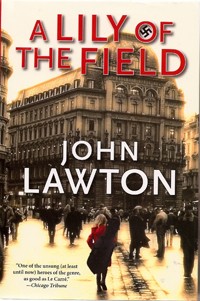 John Lawton is an American-born author who settled in England and has worked in television and film production. He is something of an enigmatic and reclusive figure, but has carved out a devoted readership with his Frederick Troy novels.
John Lawton is an American-born author who settled in England and has worked in television and film production. He is something of an enigmatic and reclusive figure, but has carved out a devoted readership with his Frederick Troy novels.
The concept of the novels is simple. Take a fictional character, and set him down in the middle of a meticulously researched historical period, let him interact with the real-life characters, throw in a bit of invention, and let the story take its course. Other authors have done this. Outside of crime fiction, the Flashman novels of George Macdonald-Fraser were perhaps the first. Flashman meets and usually gets the better of such diverse characters as Palmerston, Lincoln and Bismark. Closer to home, Philip Kerr has positioned his Bernie Gunther character so that he rubs up against Hindenburg, Heydrich, Eichmann and Eva Peron, to name but four.
Comparisons are invidious, but for someone of a certain age, Fred Troy’s world is the most fascinating. He is the youngest son of a rich emigre who fled Russia and founded a publishing empire in England. He has two slightly mad and totally licentious sisters, and a worthy, brave but dull older brother. The family has a dilapidated mansion in Hertfordshire, while Fred has a small townhouse in Goodwins Court, in the heart of London’s West End. To the puzzlement of his family, in the late 1930s, Fred decides to become a policeman. He serves his apprenticeship walking the streets of the East End under the stern eye of his mentor, George Bonham. Despite being below the required height and rather will-o’-the-wisp in build, Troy is almost stupidly brave and has a brain which is more than equal to the petty, but sometimes savage, criminals which come his way.
By the time that war is declared, Fred has left the streets of Stepney and Bermondsey, and has been fast-tracked to the Murder Squad, thanks to the eagle eye of Superintendent Stanley Onions. Rod, Fred’s older brother is interned as an alien due to his Austrian birthplace, but is released to fight in the RAF, not before meeting a fascinating cast of fellow middle-Europeans which include tailors, musicians and physicists. Fred, meanwhile, survives numerous beatings, shootings and encounters with beautiful women, who seem to fall into bed with him at the drop of a trilby.
Lawton takes a risk here, because although we love Fred to bits, it is clear that where women are concerned, he is quite amoral and almost entirely devoid of conscience. The only time he comes off worse in the emotional stakes is with the pint-sized, but utterly ruthless Larissa Tosca. Lara is one of the most compelling creations in recent fiction. She whirls through the books like a beautiful, vulnerable but indestructible she-devil.
The writing is funny, brutal and heartbreaking in turn, but the real guilty pleasure of the Troy books is the shameless name-dropping. As readers, we encounter Beaverbrook, Churchill, Hess, Eisenhower, Robert Oppenheimer, Attlee, Gaitskell, Krushchev and George Brown. We also meet Christine Keeler and the Krays, but under different names.
Despite these high profile appearances, the kaleidoscope of minor characters populating the pages, from solid London bobbies to traumatised survivors of the death camps, makes the books dazzling. If I had to choose only one of the books – God forbid – it would be A Lily Of The Field. Although Troy initially appears only on the edge of the story, this is the most heart-rending and chilling fictional account of the operation of the Nazi extermination machine that I have read. After the final page, despite some measure of redemption by the end, I did not want to sit alone in the room with that closed book.
Lawton did not write the books in chronological order. If you want to start at the beginning, time-wise, then here is the list, with the published date in brackets. A Lily of the Field (2010), Second Violin (2007), Riptide (2001), Blackout (1995), A Little White Death (1998), Old Flames (1996), and Blue Rondo (2005). This sequence is open to debate, as some of the stories have multiple time-frames. All of the Troy novels are available on Kindle.









John Lawton is one of my favourite authors, and the Troy series are my favourite crime fiction books.
I’ve read them all several times, having just finished the first, ‘Black Out’, yet again.
I think that ‘Old Flames’ is the one I like best especially where Troy and Krushchev go drinking in an east London pub.
How wonderful to find another major fan of Lawton’s work! (Flighty and I were already acquainted via twitter.) Since Second Violin, Lawton has had a new publisher in the UK and, thankfully, his backlist has followed and is in the process of being reissued. I had a chat with his UK editor last year and the consensus of opinion is that if new to Lawton the novels are best read as they were originally published. Atlantic is facilitating this by reissuing the backlist in that order, in ebook and in paperback, having started with Black Out last year. Reading in this order will retain the story arc across the series from the order in which originally written. (Reading in chronological order of setting may throw up some spoilers along the way.) I hope this information proves useful.
As an aside, beware misinformation on the net re Lawton the author. There is some uncorrected information out there. I believe ‘American-born’ may be one of those things.
I have just walked through Goodwins Court and am now having a pint in the Sailisbury. Ruby is not around; she moved to Leicester, if memory serves. Cheers to all Troy fans.